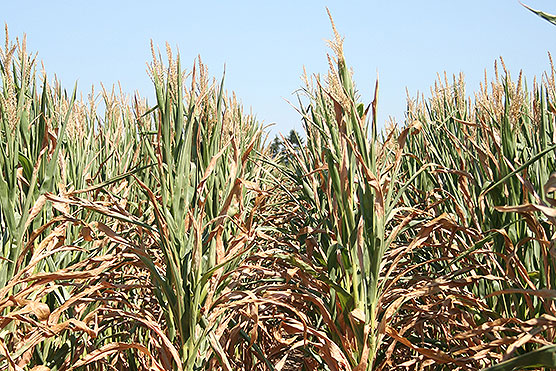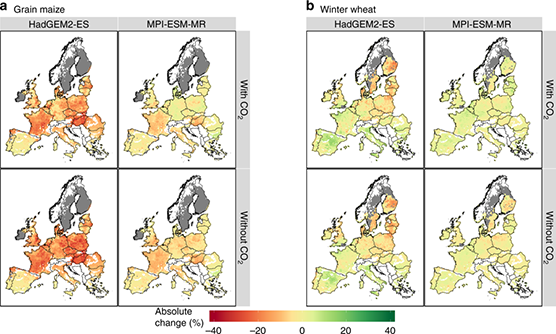
Photo: ZALF/ Wilfried Mirschel
Too hot and too dry: the summer of 2018 saw losses in arable crops in Finland and many other regions in Europe. As such weather extremes are likely to increase in the future, adapting agriculture to climate change is crucial. Important strategies include agronomic management and breeding of more tolerant crops. For plant breeders it is essential to know whether plants are more vulnerable to heat or drought. An international research team, including researchers from the Finnish Environment Institute (SYKE) and led by the Leibniz Centre for Agricultural Landscape Research (ZALF) in Germany, is providing new answers to this question in a study recently published in "Nature Communications".
The team looked at yields of grain maize and winter wheat in European agriculture to investigate, for the first time over a large scale, the relative share of heat versus drought in explaining yield losses for present-day and future climate.
“Understanding whether heat or drought poses the greatest risk to crops, farmers and plant breeders can more readily develop and select the crop varieties and management systems that are most suitable”, explains Dr. Stefan Fronzek from SYKE and one of the authors of the article.
It might seem irrelevant to separate heat from drought, because fields normally become very dry during heat waves. It is, however, important to differentiate. The defence mechanisms of plants against drought are different from those used to protect against heat stress. The researchers found that wheat and maize under climate change will be most affected by drought and less so by heat stress.
If agriculture continues to use the current varieties and current cropping systems, climate change on a whole will lead to yield losses in maize and increasing yields in wheat. Heat stress will, on average for all of Europe, not pose a problem for crops if there is sufficient rainfall, while drought stress will pose a problem for maize, in particular. In years with low yields, drought will be a problem for both maize and wheat and there will be no help from increased levels of CO2 - which would otherwise benefit yields in the absence of drought.
Knowing that drought, in particular, will be the problem, farmers and plant breeders can more readily take measures to developing new crop varieties, and choosing crop types, cropping systems and irrigation systems.

Change in yield losses due to drought for 2040-2069,
higher resolution picture.
More information
- Senior Research Scientist Stefan Fronzek, Finnish Environment Institute SYKE, t. p. +358 295 251 122, forename.surname@ymparisto.fi
- Scientific publication: Webber, H., F. Ewert, J.E. Olesen, C. Müller, S. Fronzek, A. Ruane, B. Ababaei, M. Bindi, M. Bourgault, R. Ferrise, R. Finger, N. Fodor, C. Gabaldón-Leal, T. Gaiser, M. Jabloun, K.-C. Kersebaum, J.I. Lizaso, I. Lorite, L. Manceau, P. Martre, M. Moriondo, C. Nendel, A. Rodríguez, M. Ruiz Ramos, M.A. Semenov, S. Siebert, T. Stella, P. Stratonovitch, G. Trombi and D. Wallach (2018). Diverging importance of drought stress for maize and winter wheat in Europe. Nature Communication 9:4249,
- Press release of the Leibniz Centre for Agricultural Landscape Research (ZALF): http://www.zalf.de/de/aktuelles/DokumenteMeldungen/Pressemitteilungen/2018_10_15_PM_NatureComm_Webber_engl.pdf